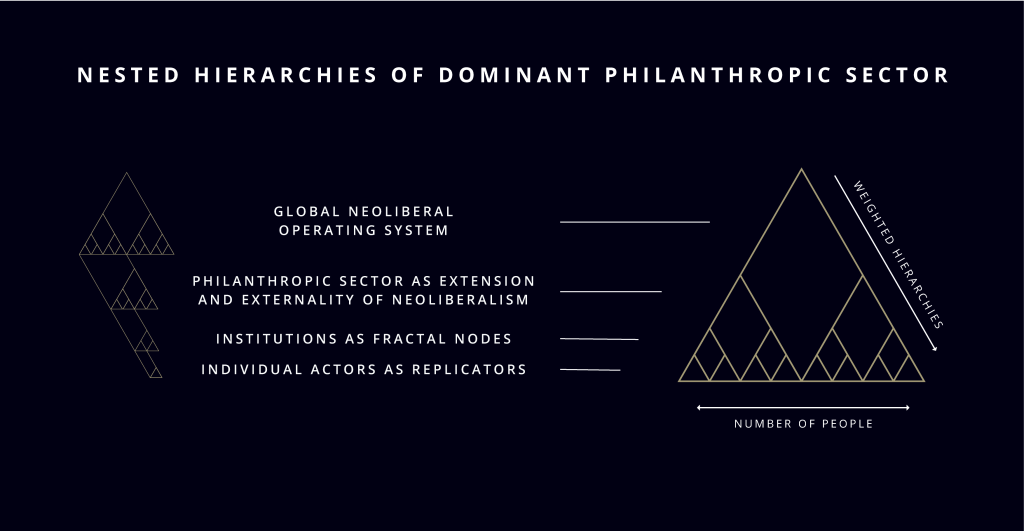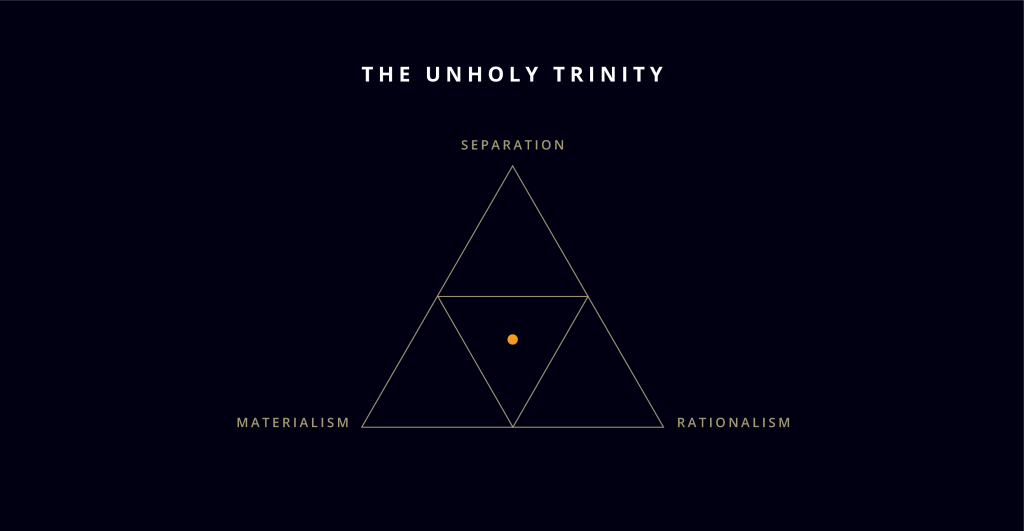With Alnoor Ladha
Alnoor dives into the history, consequences, and the destructive logic of neoliberalism that fuels our meta-crisis, and describes the contours of post capitalism – pathways to build new/ancient/emerging futures that serve Life.

Neoliberalism and the global meta-crisis: How the global meta-crisis is a direct, logical outcome of the rules and the tenets of neoliberalism.
Neoliberalism as Theology
How neoliberalism is not just as an economic theory but a pervasive theology that defines the way we engage with the world, with five key tenets:
- Humans are inherently selfish and competitive.
- Hierarchy is inevitable, and in fact, necessary for order.
- The individual is the primary unit of power.
- Material wealth and power determine well-being, meaning, life success and virtue.
- Separation and materialism define our relationship with the world; and this reality can be understood rationally.
The Unholy Trinity

The underlying logic, or ontology of neoliberalism can be called the unholy trinity of separation, materialism, and rationalism. This leads to a disconnection from the living world and an overemphasis on human dominance and materialist reductionism.
What is Post Capitalism
Post capitalism is an umbrella concept to better understand what we want to transition out of and transition into. Capitalism is not simply a system of market exchange. It is a system that measures and reduces the value of Life – including human labor, living ecosystems,relationships and life-force – via a crude system of transactional monetary exchange.
Post capitalism is not simply another ‘ism’ to replace previous ideologies. It is a conceptual container for social pluralities based on shared values that stem from an experience of the shortcomings of the existing system and the lived experience of life-centric alternatives. Some core uniting values of this idea include: reciprocity, altruism, cooperation, gratitude, gifting, regeneration, equity consciousness, communalism, shared governance & decision-making, empathy, non-violence, interbeing and solidarity with all Life.
There is no dash between ‘post’ and ‘capitalism’ in order to make clear that it isn’t simply a temporal state that exists after capitalism. Post capitalist realities exist right now, and many have existed for hundreds (if not thousands) of years despite the dominant system(s). Examples include, the Zapatistas in Chiapas, Mexico, and the Kurdish autonomous zone in Rojava, Middle East, as well as among indigenous cultures and communities that are based in the values mentioned above are inherently post capitalist.
Experiments are not operating “outside” of capitalism or in a “pure” state, because there is not necessarily an “outside” – either materially or metaphysically. Late-stage capitalism is the water we swim in and we are all entangled in the consequences to our ecosystem, nervous systems, food systems, communities, relationships, waterways, psychological conditioning and our very life-force.
Although the prefix post can imply a “context after”, it also implies a state which is informed by the context prior to it. This is why understanding the dominant system of neoliberalism is so critical.
If we do not have a clear perspective of capitalism, we become contextually irrelevant. However, if all we have is a critique of the dominant system, we become spiritually and creatively impoverished. This is why post capitalism is a necessary discourse for the collective imaginary.
Within our working definition, post capitalist realities are possible pathways that share the following principles:
POST ANTHROPOCENTRIC: Beyond the human-centric gaze and species exceptionalism, and towards the valuing of all Life.
TRANS-RATIONALIST: Where rationality is incorporated but not elevated beyond other ways of knowing, sensing and being.
POST TRANSACTIONAL: Where acts of exchange are based on relational acts of genuine connection, reciprocity, generosity, cooperation and solidarity.
ANTI-PATRIARCHAL: Where gender or sexual orientation do not determine socio-economic or cultural hierarchies.
POST HIERARCHICAL: There may be functional, fluid hierarchies agreed upon by members of relevant constituencies without domination, coercion or violence.
ANTI-COLONIALIST: Where systems and cultures are created to prevent widespread domination, extraction and/or imposition of worldviews onto “others”.
ANTI-RACIST: Acknowledging the structural disparities and inequities brought about by the construct of race, white supremacist culture and its historical antecedents, while structuring new-ancient-emerging systems that honor differences and seek to integrate reparations and reconciliation.